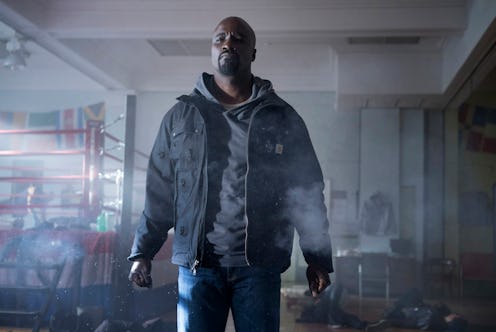
The superhero genre has plenty of time-honored conventions: secret identities, dead parents, arch-nemeses, etc. But undoubtedly one of the most tried and true staples of the genre is the origin story. In fact, some heroes' origin stories are so well known at this point — How many times have we seen Thomas and Martha Wayne murdered? — that some movies are starting to gloss over them entirely. (Spider-Man arrived in Captain America: Civil War this summer with powers fully intact and Uncle Ben already dead.) But when your protagonist isn't one of the most well-known superheroes on the planet, as is the case with Netflix's Luke Cage , an origin story is still important. So how did Luke Cage get his powers, exactly?
Despite the fact that his character was introduced as a fairly major presence in last year's Jessica Jones, we didn't learn that much about Cage's past besides the fact that his wife had been murdered (by Jessica under Kilgrave's persuasion), and that at some point he had been gifted with powers of super-strength and invulnerability, although we never learned the full story behind those abilities. It remains to be seen if Netflix will faithfully adapt Cage's origin story to the screen or alter things slightly to suit their narrative — but if they remain true to the comics, then Cage's powers have their root in the Star-Spangled Avenger himself.
In Marvel comic history, after the transformation of Steve Rogers into Captain America was a rousing success, many scientists from around the world tried to replicate the Super Soldier Serum, resulting in a string of C-level superheroes with similar abilities, including Union Jack (the British version), Master Man (the Nazi version), and Sentry (the Canadian version because yes, such a thing exists).
Luke Cage was introduced on the page in 1972 under the name Carl Lucas, a Harlem gang member who was framed by his best friend William Stryker after they both fell in love with the same woman. Imprisoned for possessing heroin that Stryker stole and planted in Carl's apartment, the future hero was locked up in Seagate prison, where he came to the attention of Dr. Noah Burstein, the son of a former Nazi scientist.
Burstein decided Carl was an ideal candidate for a secret medical experiment he was conducting based on Captain America's Super Soldier Serum. When a racist prison guard tried to kill Carl by sabotaging his transformation, it simply resulted in the treatment being amplified beyond its proscribed limits, making Carl even stronger and more invulnerable than intended. Using his newfound abilities, Carl escaped from Seagate, adopted the alias Luke Cage, and devoted his life to clearing his name and fighting crime.
There's a good chance that at least some of these elements will have changed for the Netflix version — the Marvel Cinematic Universe has always played fast and loose with its adaptations, after all — but viewers should still expect some sort of reference or connection to Steve Rogers, since the idea of replicating his transformation has already come up once before in Netflix's Marvel franchise. In Jessica Jones, cop and former soldier Will Simpson is seen consuming Combat Enhancers derived from the very same Super Soldier Serum, which grant him a burst of adrenaline that gives him increased strength and stamina.
Whether Cage's origins are wildly different or remarkably favorite to his comic book counterpart, we'll find out when Luke Cage debuts on Netflix this Friday.
Images: Myles Aronowitz/Netflix; Giphy (2)